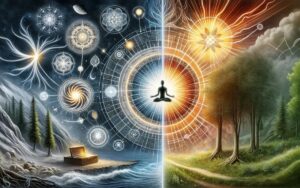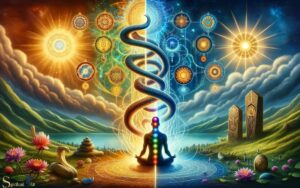Spiritual Awakening Vs Bipolar Disorder: Explain!
Distinguishing between spiritual awakening and bipolar disorder is vital as they both involve profound emotional upheaval and perception changes.
Spiritual awakening refers to a personal enlightenment experience, while bipolar disorder is a mental health condition characterized by extreme mood swings.
Spiritual awakening and bipolar disorder may seem similar due to their intense emotional experiences and transformative impacts on one’s life. However, they are fundamentally different.
- Spiritual Awakening: This is a deeply personal journey where an individual may feel an intense connection to a higher power, the universe, or their own inner wisdom. It typically leads to greater self-awareness, compassion, and a sense of peace.
- Bipolar Disorder: This is a diagnosable mental health condition that causes significant mood swings, including periods of depression and mania or hypomania. It requires medical attention and treatment.
For example, a person experiencing a spiritual awakening may feel a sudden sense of clarity and purpose without the extreme highs and lows that characterize bipolar disorder.
Recognizing the signs of spiritual awakening and bipolar disorder is crucial for maintaining mental health and pursuing spiritual growth responsibly.

Key Takeaway
5 Aspects: Spiritual Awakening Vs Bipolar Disorder
| Aspect | Spiritual Awakening | Bipolar Disorder |
|---|---|---|
| Nature | Spiritual awakening experience | Mental health condition |
| Awareness | Expanded consciousness | Fluctuating mood extremes |
| Cause | Inner growth, spiritual insight | Neurochemical imbalances |
| Duration | Persistent awakening effects | Cyclic mood episodes |
| Treatment | Spiritual practices, self-discovery | Medication, therapy interventions |
Understanding Spiritual Awakening
While spiritual awakening is often associated with a deep sense of inner transformation and enlightenment, it is important to differentiate it from other psychological experiences such as bipolar disorder.
Spiritual awakening is characterized by a profound shift in consciousness, leading to a greater connection with the self, others, and the universe.

Individuals undergoing a spiritual awakening often experience a heightened sense of awareness, empathy, and interconnectedness.
This process can bring about a sense of peace, purpose, and a deeper understanding of life’s mysteries.
Unlike bipolar disorder, which is a mental health condition marked by extreme shifts in mood, energy, and activity levels, spiritual awakening is not a pathological condition but rather a natural and transformative process that can lead to personal growth and fulfillment.
Recognizing Bipolar Disorder Symptoms
Recognizing bipolar disorder symptoms involves understanding mood swings and behaviors that are beyond the range of normal fluctuations.
It also entails recognizing the impact of these symptoms on daily life, such as disruptions in work, relationships, and overall functioning.
Mood Swings and Behaviors
Identifying mood swings and behaviors is crucial in distinguishing symptoms of bipolar disorder from other experiences.
Here are some key indicators to help recognize bipolar disorder symptoms:
- Extreme Mood Swings: Individuals may experience intense emotional highs (mania) and lows (depression) that are not in line with their circumstances.
- Impulsive Behavior: Engaging in risky behaviors such as excessive spending, substance abuse, or reckless driving without consideration of consequences.
- Agitation: Feeling restless, irritable, or agitated for prolonged periods, affecting daily functioning and relationships.
- Changes in Energy Levels: Fluctuations between periods of high energy and activity and low energy and lethargy.
- Disrupted Sleep Patterns: Significant changes in sleep habits, either sleeping too much or experiencing insomnia.
Understanding these symptoms is vital in seeking appropriate support and treatment for individuals experiencing these challenges. This awareness can lead to a better understanding of the impact on daily life.
Impact on Daily Life
Individuals experiencing symptoms of bipolar disorder may observe a significant impact on their daily lives, affecting their emotional, behavioral, and functional well-being.
Mood swings, ranging from depressive lows to manic highs, can disrupt their ability to maintain stable relationships and hold down a job.
The depressive episodes may lead to feelings of hopelessness, fatigue, and difficulty concentrating, making it challenging to fulfill responsibilities. Conversely, during manic episodes, individuals may engage in risky behaviors, overspend, or have difficulty controlling impulses.
These fluctuations can also affect their sleep patterns, leading to insomnia or oversleeping, further impacting their daily functioning.
Additionally, the unpredictability of these mood swings can make it challenging to stick to routines, impacting personal care and hygiene. Overall, the impact of bipolar disorder on daily life underscores the importance of seeking proper diagnosis and treatment.
Overlapping Experiences and Behaviors
Experiencing overlapping experiences and behaviors can present significant challenges in distinguishing between spiritual awakening and bipolar disorder.
Both can involve intense emotional states, changes in perception, and altered beliefs, leading to confusion about what one is truly experiencing.
To help clarify these complex phenomena, consider the following:
- Introspective Journey: Both spiritual awakening and bipolar disorder may involve an intense journey of self-discovery and introspection.
- Heightened Awareness: Individuals in both states may experience heightened sensitivity and awareness of the world around them.
- Euphoric States: Both spiritual awakening and bipolar disorder can lead to periods of euphoria and grandiosity.
- Impulsive Behavior: Impulsive behavior, risk-taking, and erratic decision-making can be present in both spiritual awakening and bipolar disorder.
- Challenges in Functioning: Both conditions can lead to difficulties in maintaining daily routines and functioning effectively.
Understanding these nuances is crucial in accurately discerning between spiritual awakening and bipolar disorder.
Impact on Relationships and Daily Life
Navigating the impact on relationships and daily life requires a nuanced understanding of the differences between spiritual awakening and bipolar disorder, as both can significantly influence an individual’s interactions and functioning.
| Aspect | Spiritual Awakening | Bipolar Disorder |
|---|---|---|
| Mood | Stable, with a sense of inner peace and clarity | Fluctuates between extreme highs and lows |
| Relationships | Heightened empathy and compassion | Difficulty maintaining stable relationships |
| Daily Life Routine | Enhanced focus and productivity | Disrupted sleep patterns and impulsive behavior |
| Self-awareness | Increased self-awareness and introspection | Lack of insight into one’s own behavior |
| Coping Strategies | Reliance on spiritual practices for balance | Reliance on medication and therapy for stabilization |
Understanding these differences is crucial in providing appropriate support and guidance for individuals experiencing either a spiritual awakening or bipolar disorder.
Seeking Professional Help and Support
Seeking professional help and support is essential for accurately diagnosing and effectively managing both spiritual awakening and bipolar disorder.
When navigating these experiences, individuals should consider the following:
- Consult a mental health professional who has experience in both spiritual and psychological matters.
- Keep an open and honest line of communication with your healthcare provider about your experiences and concerns.
- Engage in regular therapy sessions to explore and address underlying issues and develop coping strategies.
- Consider medication management under the guidance of a psychiatrist, if necessary for bipolar disorder.
- Seek out support groups or spiritual communities that can provide understanding, guidance, and a sense of belonging.
Navigating Spiritual Crisis and Mental Health
Navigating the intersection of spiritual crisis and mental health requires a nuanced understanding of the differences between symptoms and experiences.
It is crucial to seek professional guidance in order to differentiate between a spiritual awakening and symptoms of a mental health disorder.
Differentiating Symptoms and Experiences
During the process of differentiating symptoms and experiences, individuals face the challenge of discerning spiritual awakening from bipolar disorder. This can be a complex and sensitive task, as the symptoms of both can sometimes overlap and lead to confusion.
To help navigate this challenging process, it is important to consider the following:
- Context: Understanding the context in which the experiences or symptoms are occurring can provide valuable insights.
- Duration and Frequency: Examining the duration and frequency of the experiences can offer clues about their nature.
- Impact on Daily Functioning: Assessing how these experiences impact daily life and functioning is crucial.
- Support System: Having a strong support system can provide perspective and help in the differentiation process.
- Professional Guidance: Seeking guidance from mental health professionals and spiritual mentors can offer valuable support and clarity.
Seeking Professional Guidance
Professional assessment by mental health experts is crucial in discerning between spiritual crisis and mental health issues. Seeking guidance from professionals can provide individuals with the necessary support and resources to navigate their experiences effectively.
Below is a table outlining key differences between spiritual awakening and bipolar disorder symptoms:
| Spiritual Awakening | Bipolar Disorder |
|---|---|
| Increased empathy and compassion | Mood swings and emotional instability |
| Heightened sense of purpose and meaning | Disrupted sleep patterns and insomnia |
| Enhanced intuition and spiritual connections | Impulsivity and risky behavior |
| Emotional release and healing | Disorganized thoughts and speech |
| Seeking inner peace and enlightenment | Difficulty in daily functioning |
Consulting with mental health professionals can help individuals gain clarity and receive appropriate interventions tailored to their specific needs.
Embracing Transformative Growth and Healing
Amidst the complexities of spiritual awakening and bipolar disorder, the path towards transformative growth and healing requires a holistic approach.
It involves embracing various aspects of one’s being and experiences, and it entails the following:
- Self-Exploration: Engaging in introspective practices to understand one’s thoughts, emotions, and behaviors.
- Healing Modalities: Utilizing diverse healing modalities such as therapy, meditation, and energy work to address deep-seated wounds.
- Supportive Relationships: Cultivating connections with understanding and empathetic individuals who can provide encouragement and validation.
- Lifestyle Changes: Implementing healthy habits related to diet, exercise, and sleep to support overall well-being.
- Mindfulness Practices: Incorporating mindfulness and grounding techniques into daily routines to foster present-moment awareness and emotional regulation.
These elements form a foundational framework for individuals navigating the intricate paths of spiritual awakening and bipolar disorder. Moving forward, finding balance and integration is crucial in this journey.
Finding Balance and Integration
In navigating the complexities of spiritual awakening and bipolar disorder, finding balance and integration is essential for fostering stability and harmony in one’s journey towards transformative growth and healing.
It is crucial to recognize that both spiritual awakening and bipolar disorder can bring about intense experiences and emotions.
Therefore, integrating practices that promote emotional regulation, such as mindfulness, meditation, and therapy, can aid in finding stability.
Additionally, creating a support network of understanding individuals, including mental health professionals and spiritual mentors, can provide valuable guidance and assistance in finding balance.
Embracing a holistic approach that addresses the physical, and spiritual aspects of one’s being can aid in integrating the profound experiences of spiritual awakening with the management of bipolar disorder, ultimately leading to a more balanced and harmonious existence.
Is There a Difference Between Psychic Awakening and Spiritual Awakening?
Many people often question the distinction between psychic awakening and spiritual awakening. While psychic awakening involves heightened intuition and perception of the supernatural, spiritual awakening refers to a profound connection with the divine and inner self. Both journeys, psychic vs spiritual awakening, can lead to personal transformation and enlightenment.
Frequently Asked Questions
Can Spiritual Awakening and Bipolar Disorder Coexist in the Same Person?
Yes, it is possible for spiritual awakening and bipolar disorder to coexist in the same person.
Both experiences can manifest in unique ways, and it is important to approach each individual case with understanding and open-mindedness.
How Can Someone Differentiate Between a Spiritual Crisis and a Mental Health Crisis?
Differentiating between a spiritual crisis and a mental health crisis involves examining the nature of distress.
Spiritual crises often involve existential questioning and a search for meaning, while mental health crises encompass a range of symptoms affecting daily functioning.
Are There Specific Support Groups or Resources Available for Individuals Experiencing Both Spiritual Awakening and Bipolar Disorder?
Navigating the intersection of spiritual awakening and bipolar disorder can be complex. Seek tailored support groups or resources that integrate both perspectives.
Collaborative care can foster holistic healing, addressing the soul’s journey and mental well-being.
What Role Does Medication Play in Managing Symptoms of Both Spiritual Awakening and Bipolar Disorder?
Medication plays a crucial role in managing symptoms of both spiritual awakening and bipolar disorder. It helps stabilize mood, manage psychosis, and alleviate symptoms such as agitation and impulsivity.
Medication, when combined with therapy, can significantly improve overall well-being.
How Can Someone Integrate Their Spiritual Awakening Experience Into Their Daily Life While Managing Symptoms of Bipolar Disorder?
Integrating a spiritual awakening into daily life while managing bipolar disorder symptoms requires a balanced approach.
Grounding techniques, mindfulness practices, and professional support can help navigate this delicate journey, fostering harmony and stability amidst the complexity of experiences.
Conclusion
In conclusion, it is essential to recognize the overlapping experiences and behaviors between spiritual awakening and bipolar disorder.
Seeking professional help and support to navigate the complexities of both is crucial for finding balance and integration, which is important for transformative growth and healing.
For example, a hypothetical case study of a person experiencing intense spiritual awakening symptoms could be misdiagnosed with bipolar disorder. This highlights the need for careful assessment and understanding of these experiences.






